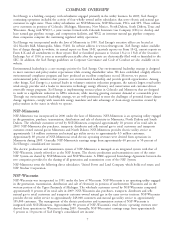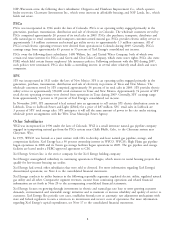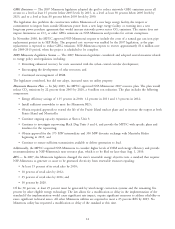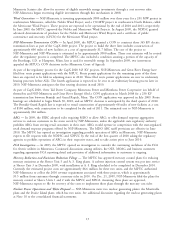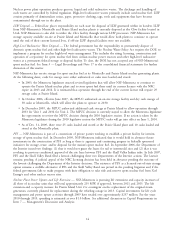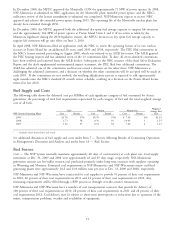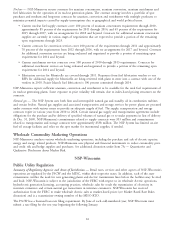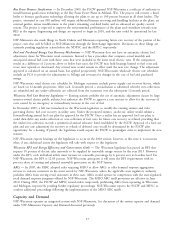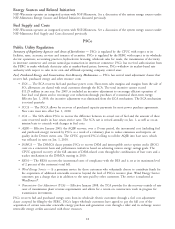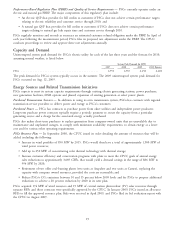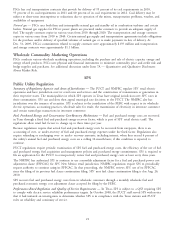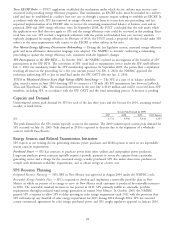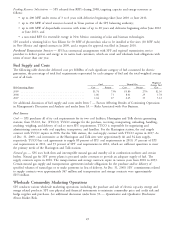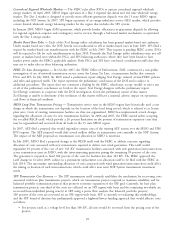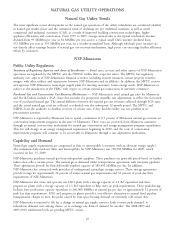Xcel Energy 2009 Annual Report Download - page 27
Download and view the complete annual report
Please find page 27 of the 2009 Xcel Energy annual report below. You can navigate through the pages in the report by either clicking on the pages listed below, or by using the keyword search tool below to find specific information within the annual report.Bay Front Biomass Gasification — In December 2009, the PSCW granted NSP-Wisconsin a certificate of authority to
install biomass gasification technology at the Bay Front Power Plant in Ashland, Wis. The project will convert a third
boiler to biomass gasification technology allowing the plant to use up to 100 percent biomass in all three boilers. The
project, estimated to cost $58 million, will require additional biomass receiving and handling facilities at the plant, an
external gasifier, minor modifications to the plant’s remaining coal-fired boiler and an enhanced air quality control
system. The project is expected to improve the environmental performance of the plant and contribute towards state
RES in the region. Engineering and design are expected to begin in 2010, and the unit could be operational by late
2012.
NSP-Minnesota also made filings in North Dakota and Minnesota requesting future rate recovery of the portion of the
project costs that will be billed to NSP-Minnesota through the Interchange Agreement. Decisions on those filings are
currently pending regulatory action before the NDPSC and the MPUC respectively.
Fuel and Purchased Energy Cost Recovery Mechanisms — NSP-Wisconsin does not have an automatic electric fuel
adjustment clause for Wisconsin retail customers. Instead, it has a procedure that compares actual monthly and
anticipated annual fuel costs with those costs that were included in the latest retail electric rates. If the comparison
results in a difference of 2 percent above or below base rates, the PSCW may hold hearings limited to fuel costs and
revise rates upward or downward. Any revised rates would remain in effect until the next rate change. The adjustment
approved is calculated on an annual basis, but applied prospectively. NSP-Wisconsin’s wholesale electric rate schedules
include an FCA to provide for adjustments to billings and revenues for changes in the cost of fuel and purchased
energy.
NSP-Wisconsin’s retail electric rate schedules for Michigan customers include power supply cost recovery factors, which
are based on 12-month projections. After each 12-month period, a reconciliation is submitted whereby over-collections
are refunded and any under-collections are collected from the customers over the subsequent 12-month period.
Wisconsin Fuel Cost Recovery Legislation — Existing statutes prohibit the use of automatic adjustment clauses by large
investor-owned electric public utilities, but authorize the PSCW to approve a rate increase to allow for the recovery of
costs caused by an emergency or extraordinary increase in the cost of fuel.
In November 2009, a bill was introduced in the Wisconsin legislature to modify the existing statutes and rules
governing electric fuel cost recovery in utility rates. Under the proposed statutes, an electric utility would submit a
forward-looking annual fuel cost plan for approval by the PSCW. Once a utility has an approved fuel cost plan, it
could then defer any under-collection or over-collection of fuel costs for future rate recovery or refund, providing that
the under/over-collection exceeds a symmetrical annual tolerance band established by the PSCW. Approval of a fuel cost
plan and any rate adjustment for recovery or refund of deferred costs would be determined by the PSCW after
opportunity for a hearing. If passed, the legislation would require the PSCW to promulgate rules to implement the new
statutes.
NSP-Wisconsin expects hearings on the legislation to occur in the 2010 session; however, at this time it is uncertain
what, if any, additional action the legislature will take with respect to this legislation.
Wisconsin RPS and Energy Efficiency and Conservation Goals — The Wisconsin legislature has passed an RPS that
requires 10 percent of electric sales statewide to be supplied by renewable energy sources by the year 2015. However,
under the RPS, each individual utility must increase its renewable percentage by 6 percent over its baseline level. For
NSP-Wisconsin, the RPS is 12.89 percent. NSP-Wisconsin anticipates it will meet the RPS requirements with its
pro-rata share of existing and planned renewable generation on the NSP System.
ARCs — In 2009, the FERC adopted rules requiring MISO to allow ARCs to offer demand response aggregation
services to end-use customers in the states served by NSP-Wisconsin, unless the applicable state regulatory authority
prohibits ARCs from serving retail customers in their state. ARCs would operate in competition with the state-regulated
retail demand response programs offered by NSP-Wisconsin. The MISO ARC tariff provisions are effective in June
2010. During 2009, the PSCW and MPSC issued orders temporarily prohibiting ARCs from operating in Wisconsin
and Michigan, respectively, pending further regulatory proceedings. NSP-Wisconsin expects the PSCW and MPSC to
conduct additional proceedings following the implementation of the MISO ARC tariffs.
Capacity and Demand
NSP-Wisconsin operates an integrated system with NSP-Minnesota. See discussion of the system capacity and demand
under NSP-Minnesota Capacity and Demand discussed previously.
17


